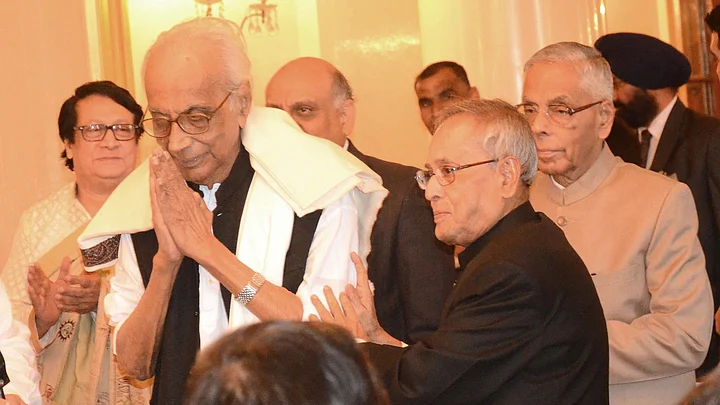Part of the growing up ritual of all kids in Bengal used to be the writing of poetry – needless to say of highly variable quality. Unsurprisingly, poets and writers enjoy a hallowed status in the state. They are also expected to contribute to political discourse, and many claim to do that, in forms increasingly incomprehensible to the rest of India.
Thus, it probably came as no shock to the collective Bengali psyche when, from Sunday, October 11, Bangla media started asking intellectuals, poets and writers whether they too would follow in the footsteps of Nayantara Sahgal (and scores of others since then) to return awards conferred on them by state-sponsored institutions like the Sahitya Akademi. Most of these so-called ‘titans’ of poetry and prose, replied in the negative.
Nirendranath Chakraborty, now 91 years old and an elder statesman of Bangla verse, said he found the idea of returning awards as a form of protest against the state a pointless exercise. Chakraborty had won the Akademi in 1974 for an outstanding collection of poems called Ulanga Raja or the Naked Emperor.
Another grand old man of poetry, Shankha Ghosh, also said he wasn’t thinking of returning the Akademi, which he won in 1977 for an anthology called Babur-er Prarthana or the Prayer of Babur. “I’m thinking of protesting in other ways. But I can’t tell you just what that will be right now,” said Ghosh. Ironically, some time ago when Communists dominated Bengal, this gentleman was regarded by many as a conscience keeper and guru of the progressive Left.
And so the list goes on: Shirshendu Mukhopadhyay, a most popular and insightful novelist won the award in 1989 for his novel Manabjamin, will also keep his prize. He says the regime that conferred the Akademi on him, “Was not the same as one that is spreading religious intolerance today.”
“Let writers step out of the air-conditioned rooms from where they send emails rejecting awards and step out in protest,” argued Subodh Sarkar, who won the prize in 2013 for Dwaipayan Hrader Dharey. “If they come out, I too shall join them.”
Only one poet, Mandakranta Sen, had the guts to return her Akademi, awarded in 2004.
“This is my mark of protest against what happened in Dadri and the attacks on writers and rationalists in other parts of the country,” she said. Her relative youth, compared to the rest of the Akademi-hugging bunch seems to have propelled her to the barricades without waiting for the rest of the crowd to assemble.
Well, it took a while, but the octogenarian Ghosh managed to get 70 poets, writers and actors to sign an open letter to President Pranab Mukherjee condemning the Modi regime. Street protests and gatherings began from Wednesday, October 14, adding to the din that rules this city during the near-weeklong celebration of the Durga Pujo.
So along with microphones blaring out Sharad Sangeet, songs composed specially for the Pujo, there are speeches and poetry lamenting the “desertification” of culture by the Modi sarkar. If you find this a trifle bizarre, you’re correct.
The standards of mainstream Bengal’s literature have declined as the political discourse has become lumpenised. By the late 1980s, the ruling Left Front had captured most centres of higher education. Then, it got busy promoting party apparatchiks to prestigious academic institutions. These included Presidency College and the University of Calcutta.
The teaching of major subjects through the medium of English was discouraged in government schools. No great harm if Bangla-medium pedagogy could live up to some standards, which it miserably failed to do.
Economic stagnation and the promotion of “ideologically committed” academics led to a steady flight of young, educated folk for greener pastures elsewhere in India and overseas. With its intelligentsia gutted by the mid-1990s, there was little new talent left in Bengal. And no real competition for ageing writers and poets, who continued to rule the roost for decades on end, shedding ideological skins with every subtle shift in political currents.
More than four years of Trinamool Congress (TMC) rule have been no better. Chief minister Mamata Banerjee has her own literary and cultural cronies. But the CM’s preference runs towards in vogue Tollywood matinee idols. People who control the world of letters have happily adjusted to this diminution of their status.
Cultural Stalinism has been replaced by Cultural Mobocracy. Most Bengali ‘intellectuals’ now feel the best thing to do is to run where lumpen herds point towards.
The state’s political distance from violent Hindutva, now rampant in north and west India, also means a false sense of security. Most frighteningly, it means a near-complete indifference to the terrible pressures their academic and cultural compatriots elsewhere in India are subject to. The bending of Bengal’s intellectual spine is complete.
